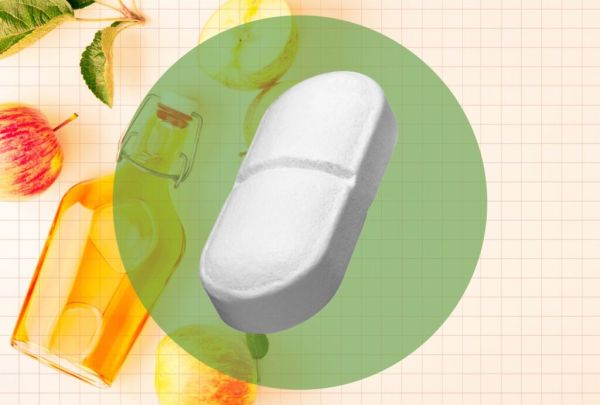
- Apple-cider vinegar may lower blood sugar, so mixing it with berberine or ALA is risky.
- Using ACV with laxatives or electrolyte powders may cause low potassium and health problems.
- Small amounts of ACV in food are safe, but higher doses should be cleared by a health care provider.
Apple-cider vinegar (ACV) may be one of the most hyped wellness hacks, often touted as a cure-all for numerous things, including gut health, weight loss and improved blood sugar control. Including it as part of your diet isn’t a big deal, but when it’s taken in larger doses and with certain supplements, it can come with risks.
“Apple-cider vinegar is often thought of as a harmless ‘superfood,’ but it can absolutely interact with supplements and medications because of its acidity, its influence on potassium levels and its mild effects on blood sugar,” explains dietitian Jane Leverich, M.S., RDN. The concern isn’t the occasional drizzle on your roasted veggies—it’s the daily “shots” or high doses promoted on social media that may cause problems.
To help you stay safe, we asked registered dietitians which supplements are most concerning to combine with apple-cider vinegar and why. Here’s what you should know.
1. Berberine
Berberine is a plant-based compound found in herbs like goldenseal and barberry that is often taken as a supplement to help manage blood sugar levels. Some research suggests that its effects can mimic those of certain diabetes medications by improving insulin sensitivity and lowering fasting glucose levels.
That’s where the concern comes in: Apple-cider vinegar is also linked to lowering fasting blood sugar, so combining the two may cause your glucose to drop more than intended. “ACV and berberine are often used to reduce blood sugar levels, but taking these supplements together may lower blood sugar too much, leading to a hypoglycemic episode,” says dietitian Amy Brownstein, M.S., RDN. Symptoms of hypoglycemia can include shakiness, dizziness, fatigue and, in more severe cases, fainting or confusion.
For people managing diabetes—or anyone already taking insulin or oral glucose-lowering medication—this overlap can be particularly risky. If berberine is part of your routine, it’s best to keep your intake of ACV low and consult a health care provider before trying higher, supplement-like doses.
2. Alpha-Lipoic Acid (ALA)
Alpha-lipoic acid (ALA) is an antioxidant naturally found in foods like spinach and broccoli, and it’s also available in supplement form, which is sometimes used to support healthy blood sugar levels. Some studies suggest it may help improve insulin sensitivity and reduce symptoms of nerve damage in people with diabetes.
On its own, ALA may offer benefits for better blood sugar, but pairing it with apple-cider vinegar could tip the scales too far. “Pairing ACV with any supplement that works to lower blood sugar increases the risk of hypoglycemia,” says Leverich. Because ACV itself can moderately lower post-meal glucose, adding ALA to the mix could increase the risk of blood sugar levels dipping too low, especially in individuals who take diabetes medication.
Hypoglycemia risk aside, taking both together may make it harder to tell which supplement—or dose—is having an effect on your blood sugar. If ALA is already part of your supplement regimen, talk with a health care provider before adding daily ACV to avoid potential interactions. In most cases, it’s safest to stick with small amounts of vinegar in food rather than concentrated “shots” or capsules.
3. Senna
Supplement laxatives, such as senna, can lower potassium levels in the body. “Taking apple-cider vinegar alongside these laxatives may lead to dangerously low potassium levels,” Brownstein tells EatingWell. “Both apple-cider vinegar and laxatives can reduce potassium in the body, and their combined effects can be potentially harmful.”
Low potassium doesn’t just show up on your bloodwork—it can cause muscle weakness, cramping, irregular heart rhythms and, in severe cases, hospitalization. If you use laxatives, it’s best to skip daily ACV “shots” or capsules. Using small amounts in cooking is far less likely to pose a problem, but talk to a health care provider before adding concentrated ACV to your supplement routine.
4. Electrolytes
Electrolyte supplements—often containing potassium, magnesium and sodium—are marketed for hydration and exercise recovery, but combining these with apple-cider vinegar could disrupt the balance of these minerals in your body.
Since ACV may lower potassium levels, pairing it with electrolyte supplements may throw off your electrolyte levels instead of restoring them, says Leverich. An older, well-documented case study described a woman who drank about 1 cup of diluted ACV daily for six years and developed dangerously low potassium and osteoporosis, highlighting how long-term, concentrated use can have real consequences.
If you take electrolyte powders, steer clear of daily ACV “shots” or high-dose capsules. Using vinegar in small amounts in food is safe, but be cautious when supplementing electrolytes, especially potassium.
You deeper
7 Things You Should Look for When Buying a Supplement, According to Dietitians
Our Expert Take
Apple-cider vinegar certainly has its place in a healthy diet, but like any food or supplement, context matters. Including small amounts of ACV in your diet isn’t usually cause for concern, but in higher doses, ACV may interact with some supplements. Especially those that affect blood sugar or electrolyte balance, such as berberine, alpha-lipoic acid, laxatives or electrolyte powders containing potassium.
That doesn’t mean you need to avoid ACV altogether. Using it in cooking as a salad dressing, marinade or flavor booster is generally safe and can even add nutrition to meals. If you’re considering adding larger doses of ACV to your wellness routine, it’s a good idea to check in with a health care provider first.




